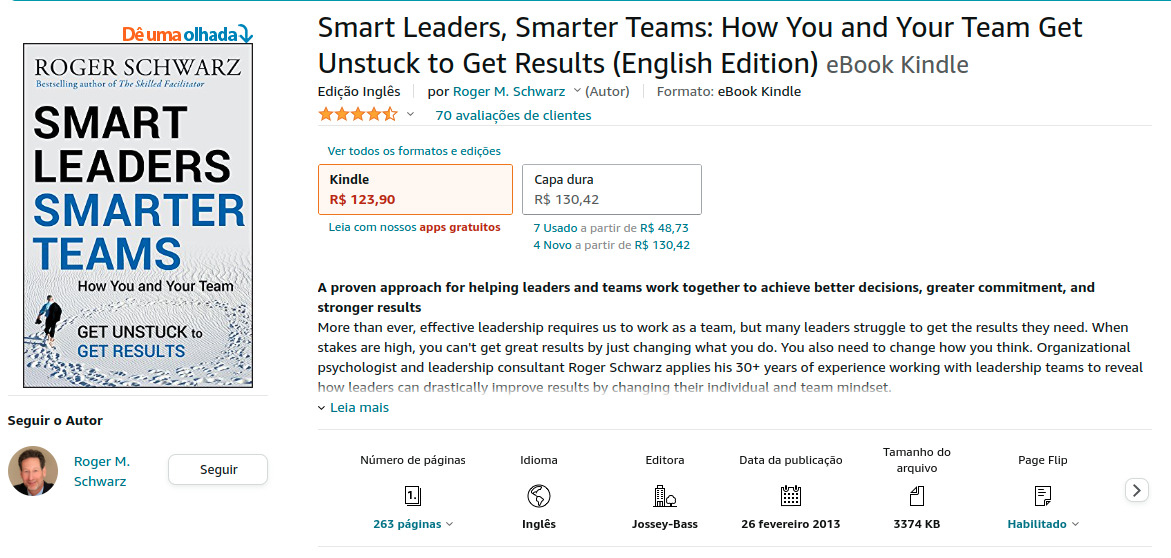Wip__agil_entendendo_seu_comportamento
#
Lead author of Facilitation : Smarter Teams
Values Built Into the Unilateral Control Mindset
- Value 1: Win, don’t lose.
- Value 2: Be right. Being right is a corollary of win, don’t lose.
- Value 3: Minimize expression of negative feelings.
- Value 4: Act rational.
Value 1
Value 2
Value 2: Be right. Being right is a corollary of win, don’t lose. When you value being right, you take pride in showing others that your views are accurate.” (from “Smart Leaders, Smarter Teams: How You and Your Team Get Unstuck to Get Results (English Edition)” by Roger M. Schwarz)
Value 3
Value 3: Minimize expression of negative feelings. Minimizing expression of negative feelings means keeping unpleasant feelings—yours and everyone else’s—out of the conversation.” (from “Smart Leaders, Smarter Teams: How You and Your Team Get Unstuck to Get Results (English Edition)” by Roger M. Schwarz)
Value 4
Value 4: Act rational. The more you value acting rational, the more you expect yourself and others to remain purely analytical and logical.” (from “Smart Leaders, Smarter Teams: How You and Your Team Get Unstuck to Get Results (English Edition)” by Roger M. Schwarz)
Assumptions Built Into the Unilateral Control Mindset
-
Assumption 1: I understand the situation; those who disagree don’t. This is the assumption that whatever information and understanding you bring to the situation are accurate and complete, and so are the conclusions you draw from them. In other words, the way you see things is the way things really are.” (from “Smart Leaders, Smarter Teams: How You and Your Team Get Unstuck to Get Results (English Edition)” by Roger M. Schwarz)
-
Assumption 2: I am right; those who disagree are wrong. This assumption is an extension of the first one.” (from “Smart Leaders, Smarter Teams: How You and Your Team Get Unstuck to Get Results (English Edition)” by Roger M. Schwarz)
-
Assumption 3: My motives are pure; those who disagree have questionable motives. You consider yourself an earnest seeker of truth, acting in the best interests of the team or organization.” (from “Smart Leaders, Smarter Teams: How You and Your Team Get Unstuck to Get Results (English Edition)” by Roger M. Schwarz)
-
Assumption 4: My feelings and behaviors are justified. Because others don’t understand the situation as it really is (read: as you see it), because others are wrong, and because others may have questionable motives, you consider your feelings and behaviors justified.” (from “Smart Leaders, Smarter Teams: How You and Your Team Get Unstuck to Get Results (English Edition)” by Roger M. Schwarz)
-
Assumption 5: I am not contributing to the problem. In the unilateral control mindset, you see your feelings and the behaviors that result from them as the natural and inevitable results of others’ actions toward you.” (from “Smart Leaders, Smarter Teams: How You and Your Team Get Unstuck to Get Results (English Edition)” by Roger M. Schwarz)
Unilateral Control Behavior
-
State my views without asking for others’ views, or vice versa. That is, you either present your views alone or conceal them while asking for those of others, but don’t get both sets on the table at the same time.” (from “Smart Leaders, Smarter Teams: How You and Your Team Get Unstuck to Get Results (English Edition)” by Roger M. Schwarz)
-
Withhold relevant information. Because winning is paramount, you share the information that will advance your views and withhold information that won’t.” (from “Smart Leaders, Smarter Teams: How You and Your Team Get Unstuck to Get Results (English Edition)” by Roger M. Schwarz)
-
Speak in general terms and don’t agree on what important words mean. When you make a general statement—say, “I need some of you to step up”—your team doesn’t know who you’re talking about and what you mean by “step up.”” (from “Smart Leaders, Smarter Teams: How You and Your Team Get Unstuck to Get Results (English Edition)” by Roger M. Schwarz)
-
Keep my reasoning private; don’t ask others about their reasoning. You don’t explain why you are saying what you’re saying and asking what you’re asking. Sharing your reasoning would make you vulnerable to people challenging your thinking, which could reduce the chance that your view will win.” (from “Smart Leaders, Smarter Teams: How You and Your Team Get Unstuck to Get Results (English Edition)” by Roger M. Schwarz)
-
Focus on positions, not interests. By focusing on a particular solution instead of the underlying needs you are trying to address, you and your team get dug into your positions and fail to craft solutions that meet team members’ needs and generate broad commitment.” (from “Smart Leaders, Smarter Teams: How You and Your Team Get Unstuck to Get Results (English Edition)” by Roger M. Schwarz)
-
Act on untested assumptions and inferences as if they were true. Because you assume that you understand the situation and are right, there’s no need to test any assumptions or inferences you’re making.” (from “Smart Leaders, Smarter Teams: How You and Your Team Get Unstuck to Get Results (English Edition)” by Roger M. Schwarz)
-
Control the conversation. To ensure that you win, you make sure that the conversation moves in the direction you want it to move. You make sure that people talk about topics that you consider relevant and that further your point of view.” (from “Smart Leaders, Smarter Teams: How You and Your Team Get Unstuck to Get Results (English Edition)” by Roger M. Schwarz)
-
Avoid, ease into, or save face on difficult issues. Because you want to minimize the expression of negative feelings, you don’t address issues that could make others or you uncomfortable.” (from “Smart Leaders, Smarter Teams: How You and Your Team Get Unstuck to Get Results (English Edition)” by Roger M. Schwarz)
Result
-
Lower-Quality Decisions and Less Innovation. Leadership teams don’t make products or services—they make decisions. Some decisions are strategic;” (from “Smart Leaders, Smarter Teams: How You and Your Team Get Unstuck to Get Results (English Edition)” by Roger M. Schwarz)
-
Longer Implementation Time. Teams often try to save time by shortening their time to make a decision.” (from “Smart Leaders, Smarter Teams: How You and Your Team Get Unstuck to Get Results (English Edition)” by Roger M. Schwarz)
-
Increased Costs. Poor decisions, reduced innovation, and longer implementation time often lead to increased costs. Poor and less innovative solutions can be more expensive because they fail to explore assumptions about what a solution does or doesn’t need to do.” (from “Smart Leaders, Smarter Teams: How You and Your Team Get Unstuck to Get Results (English Edition)” by Roger M. Schwarz)
-
Decreased Trust. When team members believe they are right and those who disagree with them are wrong and have questionable motives, they don’t inspire trust in one another” (from “Smart Leaders, Smarter Teams: How You and Your Team Get Unstuck to Get Results (English Edition)” by Roger M. Schwarz)
-
Reduced Learning, Greater Defensiveness, and Unproductive Conflict. The faster your leadership team learns, the faster it can anticipate or respond to changing conditions, both outside and inside your organization.” (from “Smart Leaders, Smarter Teams: How You and Your Team Get Unstuck to Get Results (English Edition)” by Roger M. Schwarz)
-
Inappropriate Dependence on Others. In teams with healthy working relationships, team members appropriately depend on one another.” (from “Smart Leaders, Smarter Teams: How You and Your Team Get Unstuck to Get Results (English Edition)” by Roger M. Schwarz)
-
A framework of unilateral control breeds inappropriate dependencies within the team, as members shift their burden onto others—including onto the leader. If Sean and Marla are on your team and Sean comes to you frustrated that Marla is not supporting his group, you might agree to talk to Marla for Sean instead of having Sean directly resolve the issue with Marla. If you do this, you contribute to unnecessary and inappropriate dependence on yourself and reduce Sean’s accountability for his behavior.” (from “Smart Leaders, Smarter Teams: How You and Your Team Get Unstuck to Get Results (English Edition)” by Roger M. Schwarz)
How Unilateral Control Reinforces Itself
Getting Unstuck to Get Results
“Getting Unstuck to Get Results The Mutual Learning Approach” (from “Smart Leaders, Smarter Teams: How You and Your Team Get Unstuck to Get Results (English Edition)” by Roger M. Schwarz)
-
“Transparency and Curiosity: Creating a Common Pool of Understanding for Better Results” (from “Smart Leaders, Smarter Teams: How You and Your Team Get Unstuck to Get Results (English Edition)” by Roger M. Schwarz)
-
“Transparency means sharing all relevant information—including your thoughts, feelings, and strategies—with the appropriate people at the appropriate time. It means explaining why you’re saying what you’re saying, why you’re asking what you’re asking, and why you’re doing what you’re doing.” (from “Smart Leaders, Smarter Teams: How You and Your Team Get Unstuck to Get Results (English Edition)” by Roger M. Schwarz)
-
“The Power of Transparency and Curiosity Many researchers have found that transparent and curious leaders produce the three main benefits of the mutual learning approach: improved performance, better team relationships, and greater individual well-being. The endnotes throughout this section list the most relevant of these studies. Transparency,” (from “Smart Leaders, Smarter Teams: How You and Your Team Get Unstuck to Get Results (English Edition)” by Roger M. Schwarz)
-
“Combining Transparency and Curiosity I talk about transparency and curiosity together because each requires the other. Research shows that in more effective teams, members move back and forth between being transparent and being curious, without getting stuck in just one of these modes.26” (from “Smart Leaders, Smarter Teams: How You and Your Team Get Unstuck to Get Results (English Edition)” by Roger M. Schwarz)
-
“Compassion Versus Distancing Some people are naturally more compassionate than others. But for everyone, it’s harder to be compassionate when feeling frustrated, disappointed, or annoyed. Those feelings make it tempting to distance yourself from others and their pain by telling yourself that they don’t deserve compassion. As Diane Berke writes, “The major block to compassion is the judgment in our minds. Judgment is the mind’s primary tool” (from “Smart Leaders, Smarter Teams: How You and Your Team Get Unstuck to Get Results (English Edition)” by Roger M. Schwarz)
-
“Responding with Compassion In a meeting with one or more members of your leadership team, assuming you’ve connected to the pain others seem to be feeling, how do you respond? Do you ignore it and simply refocus on the agenda? Do you tell them things will be easier if they focus on the positive? Do you acknowledge that this is hard for people and then move on? Or do you temporarily—even briefly—put aside your agenda and find out how they are feeling and what they need from you, if anything? All but the last response distance you from people who are suffering.” (from “Smart Leaders, Smarter Teams: How You and Your Team Get Unstuck to Get Results (English Edition)” by Roger M. Schwarz)
Assumptions of the Mutual Learning Mindset
- Mutual Learning Behaviors
Results of Mutual Learning
- “Results of Mutual Learning The results you get with a mutual learning mindset are the opposite of those you get with unilateral control—but they still fall into the same three types: team performance, working relationships, and well-being. See Figure 3.3. Figure 3.3. Results of a Mutual Learning Mindset” (from “Smart Leaders, Smarter Teams: How You and Your Team Get Unstuck to Get Results (English Edition)” by Roger M. Schwarz)
References :
Book : Smart Leaders, Smarter Teams: How You and Your Team Get Unstuck to Get Results (English Edition): https://www.amazon.com.br/dp/B00BMU3IC4/ref=dp-kindle-redirect?_encoding=UTF8&btkr=1

Course : Develop decision-making, learning and decision-making skills : https://k21.global/br/treinamentos/tecnicas-ageis-facilitacao?cupom=GOVIN


